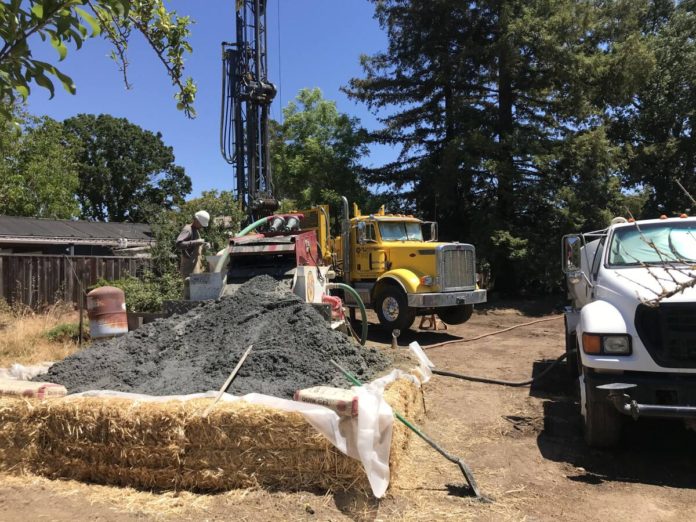Drought can be good for some businesses
Laundry facilities, plumbers and well diggers are some of the industries that can financially benefit from droughts.
“Our largest washing machine washes 80 pounds of laundry at one time. It uses 67 gallons of water to do this. To wash 80 pounds of laundry at home, it would require eight loads in the standard washing machine you would find in a typical suburban garage and this would use approximately 350 gallons of water,” explained Gaeton Tamo.
He and his sons, Mario and Dante, operate 14 coin laundries in Guerneville, Healdsburg, Santa Rosa, Sebastopol, Rohnert Park, Sonoma, Napa, Oakland and Brentwood. Each facility has about 20 washing machines.
When people start looking at how to curtail water use at home, going to a laundromat can be a saver in water and time.
Herb McKay has been in the laundry business for 48 years, with storefronts in Vacaville, Winters, Woodland and Richmond.
“We have very energy-efficient machines. They can get more done with less water than with a home washing machine,” McKay said.
McKay didn’t own any of his current laundromats during the last drought, so he doesn’t have a price comparison for water/sewer bills in normal times vs. drought. His busiest location in Richmond comes with a water bill ranging from $4,000 to $4,500 a month, and a sewer bill of $5,000. Each location is with a different water/sewer company.
Those amounts are in “normal” times, with McKay expecting them to go higher if people start doing their laundry outside their home because of the drought.
“We advertise that it helps lower their bill and consumption. You are using less water at a laundromat than you would at your home,” McKay said.
Another way for homeowners to be proactive is to repair leaky faucets and water lines.
The Environmental Protection Agency reports, “The average household’s leaks can account for nearly 10,000 gallons of water wasted every year, and 10% of homes have leaks that waste 90 gallons or more per day. Household leaks can waste nearly 1 trillion gallons of water annually nationwide. Fixing easily corrected household water leaks can save homeowners about 10% on their water bills.”
Christian Macauley, who with brother Sean, owns American Leak Detection in San Rafael, said calls are up 20% because of the drought.
“People are more frantic than ever,” Macauley said. He understands the need for conservation. He uses a bucket in his shower to capture the cold water before it gets hot and then uses that container for irrigation.
Macauley’s company works on main lines, irrigation and most kinds of pipes underground. A number of recent calls are from pool owners noticing the water level decreasing and thus suspecting a leak, he said.
“With the pools we are finding with these winds and with the dry environment, (they) are losing a quarter inch a day because of evaporation,” Macauley said. “My recommendation is people get pool covers, if possible.”
The Hamilton Community Pool in Novato knows all about evaporation, which is why the lone significant drought protocol there is to cover the pool each night.
The drought is causing the phone to ring off the hook at Irwin Well Drilling in Fulton in Sonoma County and at McLean & Williams, water well specialists in Napa. The problem is neither company can keep up with demand; there is only so much drilling equipment and manpower to do the jobs.
Gonzalo Salinas, president and co-owner of McLean & Williams, said call volume is up 60% because of the drought. These are locals, regional prospects and people out of state.
He expects to drill 40 wells this year, which is about normal —normal being 35 to 40 wells a year. It takes specialized equipment to drill, and Salinas only has so much of that specialized equipment. So, a lot of work gets turned away.
“In most cases, 90% of the time, it’s new wells,” Salinas said. “A small percentage can be redrilled deeper.” He said well drilling costs between $15,000 and $20,000 for an average domestic system.
Geological formations in Napa County vary, meaning the wells do as well. Some are 150-feet deep, others more than 1,000 feet down.
Nolan Irwin, who is a third-generation owner of Irwin Well Drilling, believes the drought has affected the perception of well owners more than anything. It’s as though they want to know they have access to a large amount of water even if they don’t need it or use it. It’s a mentality similar to when people began hoarding toilet paper and cleaning wipes at the height of the pandemic.
Calls have tripled this year, Irwin said. People in Santa Rosa are calling wanting wells dug even though they have city water. Irwin attributes this to a heightened awareness of water issues, but not for a real need for that underground water.
Credit: Source link































